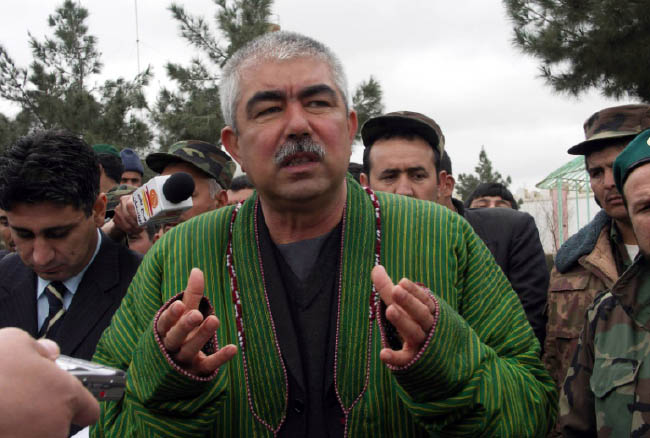KABUL – First Vice-President Abdul Rashid Dostum has left for Turkey, officials said Saturday, in what could be another long exile for the former warlord following allegations that he raped and tortured a political rival.
Dostum departed late Friday in the middle of a criminal investigation that has drawn attention to the culture of impunity that is hobbling Western-backed efforts to instil the rule of law in Afghanistan.
Speculation is rife that he has sought temporary exile in Turkey in a bid to escape prosecution, with observers saying it could mark the end of his checkered political career in Afghanistan.
But a spokesman for Dostum, Bashir Ahmad Tahyanj, insisted that he would return after visiting Turkey for "medical checkups and to visit his family".
Dostum is accused of abducting rival Ahmad Ishchi last year during a game of Buzkashi -- a type of polo played with an animal carcass -- in northern Jowzjan province.
Dostum, 63, allegedly kept Ishchi hostage in his private compound for five days, where he was said to be tortured and sodomised, an accusation that Dostum has denied.
Nobody was arrested or indicted despite reports that medical evidence backed Ishchi's claims that he was abused.
The country's attorney general launched an investigation into the allegations but Dostum evaded questioning by being holed up in his palace in central Kabul, guarded by his armed militiamen.
Afghanistan's Western allies initially piled pressure on President Ashraf Ghani's government to prosecute Dostum, who has survived all previous allegations of abuse.
But amid the public standoff it was clear the government favoured exile rather than a criminal trial against Dostum, which could trigger violence from his Uzbek support base.
The development highlights what human rights defenders call a sobering reality of Afghan politics -- some strongmen are simply too powerful to prosecute.
"It's a stunning example of what has become standard practice in Afghanistan, not just for Dostum but for anyone in a position of power: having promised to deliver justice the government has shown itself ultimately unwilling to do so," said Patricia Gossman, Afghanistan researcher with Human Rights Watch.
Despite his human rights record, Dostum was invited to join the National Unity Government in 2014 in a bid by Ghani to attract the support of his Uzbek constituency. (AFP)
Home » Afghanistan » Dostum Departs for Turkey
Dostum Departs for Turkey

